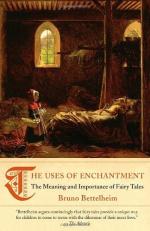
|
Part 1: Chapters 1-7
• Children that are denied fairy tales are being robbed.
• Fairy tales have deep and significant roots.
• Some parents disapprove of fairy tales.
• The differences between fairy tales, myths, and parables is discussed.
• Intellect is formed by experience and exposure to fantasy stories.
• The Oedipus Complex is explained.
• Author discusses fairy tales in various cultures.
• The concept of Optimism versus Pessimism is examined.
• Author addresses the importance of a dream life.
• The Pleasure Principle versus Reality is discussed.
Part 1: Chapters 8-15
• Children collect impressions that are not fully formed.
• Fantasy helps a child fill in gaps in understanding.
• Cinderella is used as an example of sibling rivalry.
• Fairy tales show children that it is always possible to find a solution.
• A child's dreams are very simple and create the need for fantasy.
• Adults not exposed to fairy tales may not understand internal and external worlds.
• Duplicity...
|
This section contains 340 words (approx. 2 pages at 300 words per page) |

|




